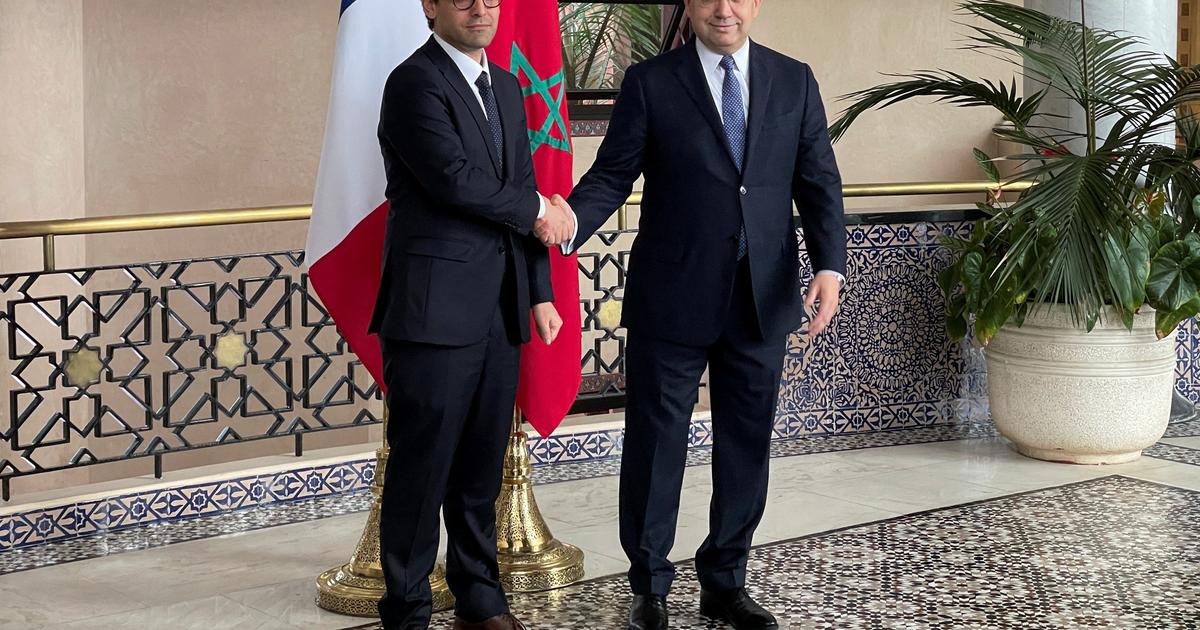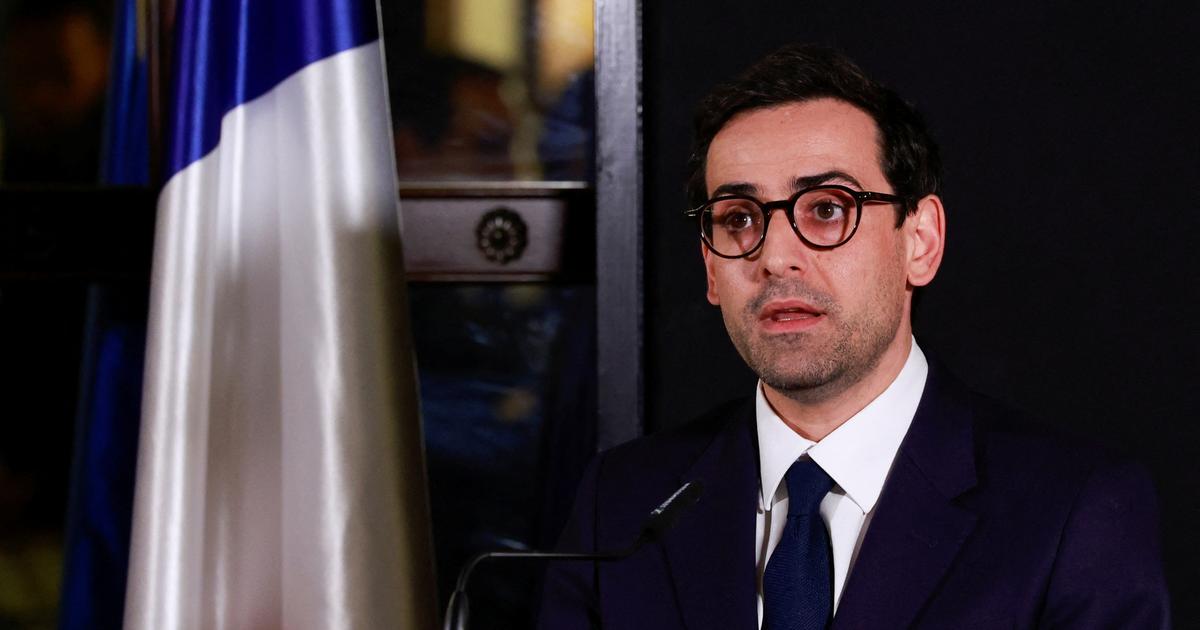King Mohamed VI of Morocco, visiting Laayoune, capital of Western Sahara, in 2015. FADEL SENNA / AFP
The diplomatic crisis that Rabat unleashed in March by suspending relations with the German embassy is having an impact on the bilateral aid that the greatest power of the European Union allocates to the development of Morocco. The interruption of relations also affects the German Society for International Cooperation (GIZ, for its acronym in German) and the German Development Bank (KfW), as confirmed by a spokesman for the country's Foreign Ministry to this newspaper. This clash with the two organizations implies that almost all of Berlin's operations in the field of development and cooperation are being “affected by the unilateral policy of Morocco”. The German spokesman specified that some projects are "completely suspended."
The confrontation leaves part of the 1,400 million euros in development aid and cooperation that Germany allocates this year to the Maghreb country in the air.
“That makes us the most important bilateral donor in Morocco.
Most of that money is devoted to the fight against covid-19 ”, the same sources specify.
In 2019, Morocco was the third African country to receive the most development cooperation aid from Germany, after Egypt and Tunisia, according to data from the German Ministry of Economic Cooperation and Development.
More information
Germany asks Morocco for explanations after the diplomatic clash over Western Sahara
Morocco raises diplomatic pulse with Germany over Western Sahara
Rabat seems willing to assume the economic cost and diplomatic wear that the crisis unleashed with both Germany and Spain may cause. The Government has maintained the two pulses in parallel for several months. The backdrop to both crises is the position that the two European states hold on Western Sahara. Every time the Moroccan Foreign Minister, Naser Burita, has tried to disassociate the European Union from the diplomatic crisis that his country has with Spain in order to reduce it to a "bilateral" problem, he has avoided mentioning Germany.
However, both Spain and Germany have received the same accusation from Morocco: that of maintaining “hostile” positions regarding that disputed territory pending decolonization, which is under the control of the Maghreb country. The Spanish and German governments have not even opposed the solution proposed by Morocco to grant regional autonomy to Western Sahara. They have only expressed their desire to find a "lasting" solution, accepted by "both parties" and within the framework of the UN.
The German Ministry of Economic Cooperation and Development confirms that the projects it manages have been paralyzed since March, both those of the federal government and those that are channeled through non-governmental organizations. Most of the aid is intended to develop the sector of small and medium-sized enterprises with the aim of creating jobs: jobs for young people that are "urgently needed" in the country, said a ministerial spokesman. Last year, Germany committed € 420 million to SMEs
Moroccans, most of it in the form of loans. In addition, the German Development Bank provided another 717 million euros also in loans, but specifically to fight the COVID-19 crisis. This financing was used primarily for credit guarantee programs that helped companies to sustain themselves.
One of the projects that has been paralyzed since Morocco suspended relations with Germany in March is the agreement that both countries signed in June 2020 to produce and research green hydrogen, a gas on which there are many hopes placed in the energy transition promoted by the Union European. German Foreign Minister Heiko Maas was questioned in Parliament several weeks ago about that agreement and replied that the funds for that project will only be disbursed if Morocco fulfills its contractual obligations. And he added: "If the current situation persists, the German Government considers that negative consequences for the creation of companies should not be excluded."
Berlin values the "many years of successful development cooperation with Morocco," said the spokesman, adding that in recent times the Maghreb country "has implemented many reforms" to the liking of Germany.
The improvements in "good governance, the development of the private sector and anti-corruption measures" led the federal government to sign a collaboration agreement in 2019 to support this reformist path, highlighted this source.
Morocco thanked in its day the material collaboration from Berlin.
In December, in the midst of the pandemic, after the German government unblocked aid of 1,387 million euros, the Foreign Minister of the Maghreb country held a telephone interview with the German Minister for Economic Cooperation and Development, Gerd Müller.
Burita praised "the excellence of the cooperation between the two countries."
Three months later, the Rabat head of diplomacy - who usually always acts under the "high instructions" of King Mohamed VI - sent a circular to members of the Government in which he ordered the "suspension of all contact" with the German embassy and its attached agencies. It alleged as a cause the "deep misunderstandings" on "fundamental issues" for Morocco. Whenever "fundamental issues" are discussed, the Maghreb country often refers to its "territorial integrity". In other words, Western Sahara.
What happened between the sentence at the beginning of December where Burita praised "the excellence of bilateral relations" and the March letter where he evoked the "deep misunderstandings", was that the then president of the United States, Donald Trump, granted December to Rabat the recognition of Moroccan sovereignty over the Sahara, in exchange for Morocco normalizing its relations with Israel. The following day, the German Foreign Ministry issued a statement applauding this normalization of relations between Israel and Morocco. But he added that the government's position on Western Sahara had not changed and that it continued to support the search for a solution "accepted by both parties and under the mediation of the UN." No Western country has followed in Donald Trump's footsteps thus far.They all subordinate their position to UN resolutions.
The Moroccan authorities decided to harden the diplomatic pulse with Germany and in May they called their ambassador, Zohour Alaoui for consultations.
A communiqué from the Moroccan Ministry of Foreign Affairs alleged as the cause of this action the fact that the German authorities multiplied “hostile acts” and “attempted actions” against the “superior interests of Morocco”.
Consular blockade
Now, a large part of the German diplomatic staff stationed in Morocco is sitting idly by.
Among them, those of the consular section stand out.
The German Foreign Ministry points out from Berlin that its employees cannot assume the "basic" functions established by the Vienna Convention of 1963. This convention, promoted by the UN, regulates consular relations between countries through 79 articles.
The German Embassy in Rabat announces on its website the limitations to which it has been exposed since on March 1, Morocco "unilaterally suspended" its cooperation.
It also explains that the Moroccan police are refusing, "without explaining the reason", to process the service of extension of stay of German citizens in the country.
The legation warns that “if the period of stay in the country has expired”, it will not be able to do anything for its nationals, due to “the suspension of contact imposed by the Moroccan authorities”.
It also announces that it cannot communicate with the Moroccan Ministry of Justice or with the penitentiary institutions to assist its citizens.
The Vienna Convention establishes in Article 36 that the authorities of the receiving State –in this case, Morocco– “shall inform without any delay” the competent consular office in that State –that is, the German office– when “a national of the Sending State is arrested in any way, detained or placed in preventive detention ”. That precept is not being fulfilled right now in Morocco, according to German diplomacy.
Berlin was Rabat's seventh business partner in 2019, behind Spain and France, which occupy the top positions. There are some 300 German companies operating in the North African country. "Some of them offer professional training to young Moroccans in many relevant sectors," German diplomatic sources point out. For its part, the German Society for International Cooperation focuses on supporting issues such as gender equality, human rights, decentralization and projects to combat climate change.
The 1,400 million euros that Germany has allocated as development aid for Morocco in 2021 could be equated to some of the large investments in infrastructure undertaken by the Maghreb country in the last five years. For example, the Noor solar plant, one of the largest in the world, inaugurated in 2016 at the gates of the desert, cost 2 billion euros. And it was precisely the German Development Agency that contributed the most money to its construction, with 754 million euros; followed by the European Investment Bank, with 209 million.
But most of the money offered by Germany in 2021 is not going to infrastructure, but to the fight against the pandemic, according to German diplomatic sources. In Morocco, the donation made by King Mohamed VI in March 2020 to combat covid-19, through his business group Al Mada, had a great media impact. The monarch offered 200 million euros, a considerable sum, but seven times less than what Berlin promised.

/cloudfront-eu-central-1.images.arcpublishing.com/prisa/ZQECZYV4PVBVXBHWAGI5BBL4QE.jpg)












